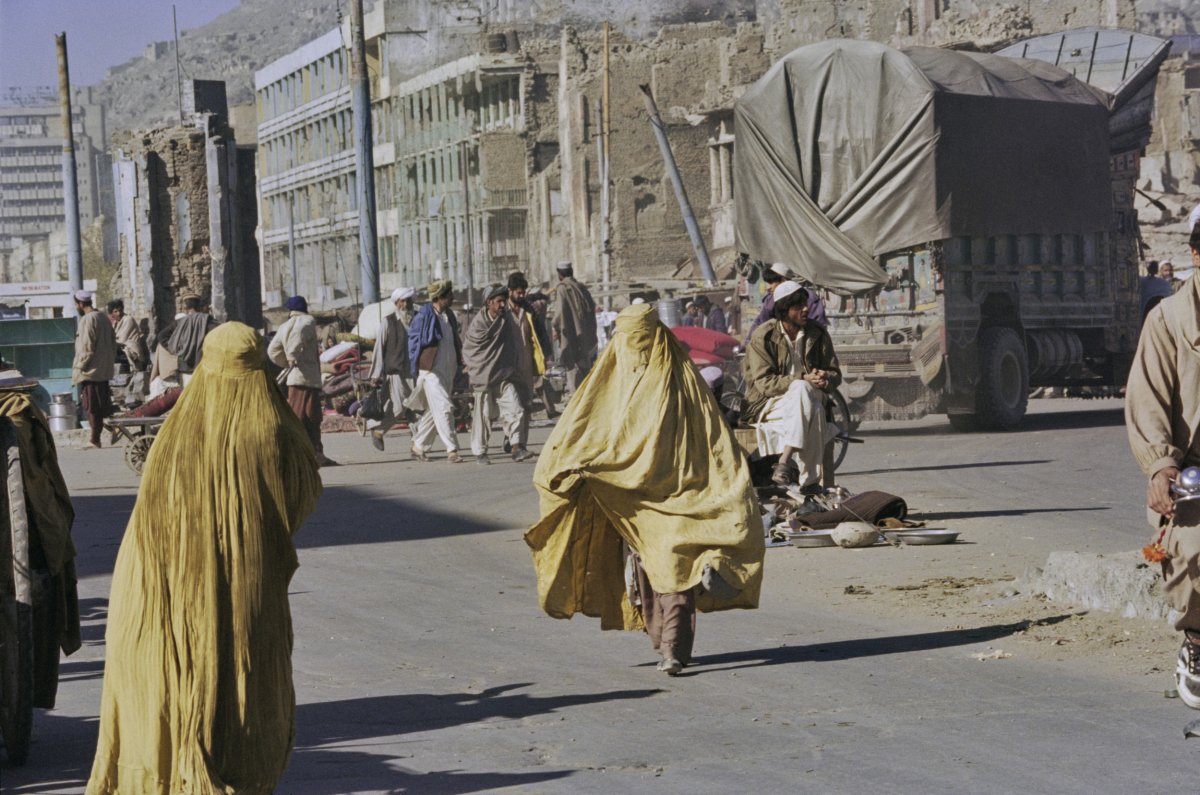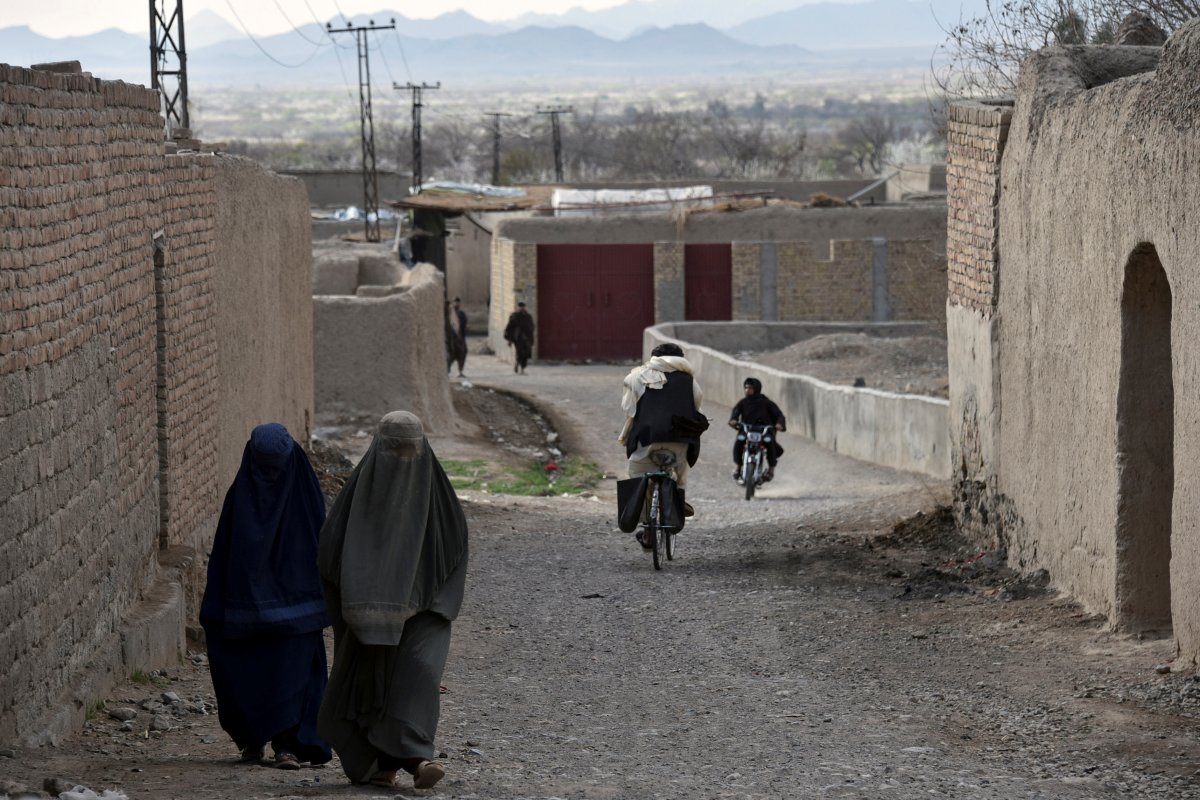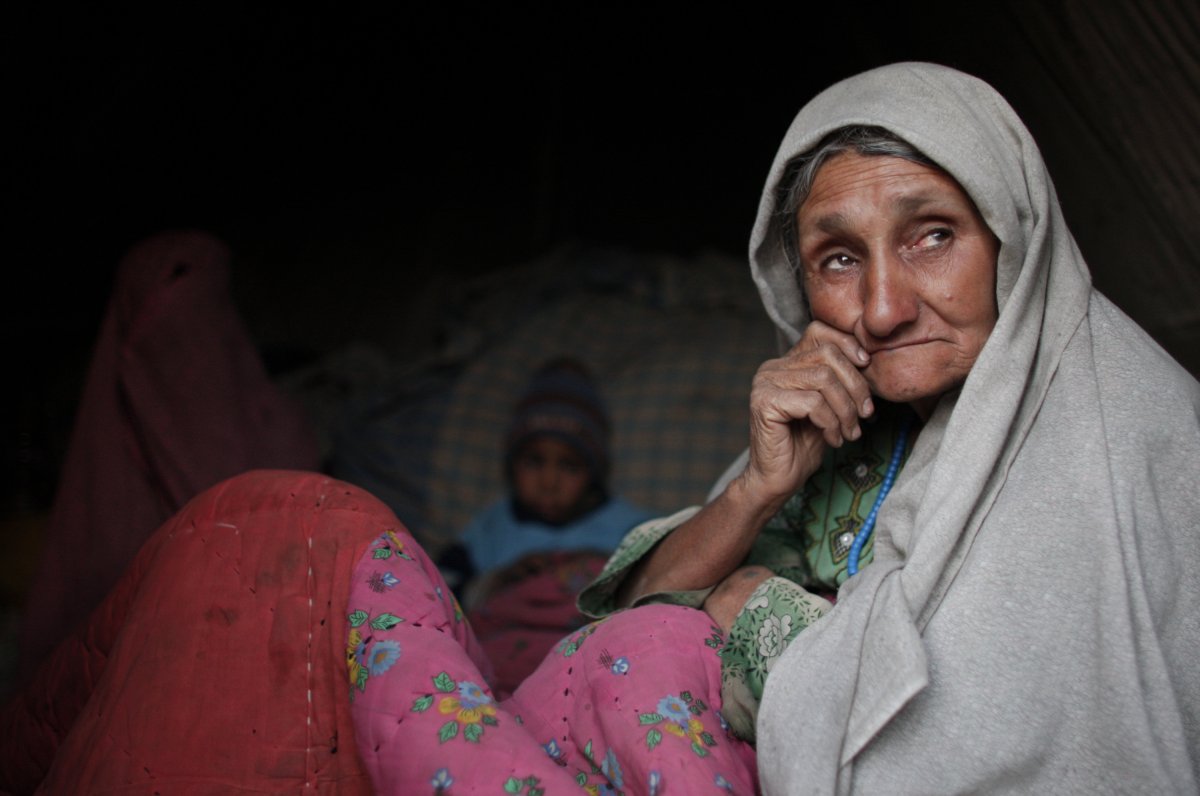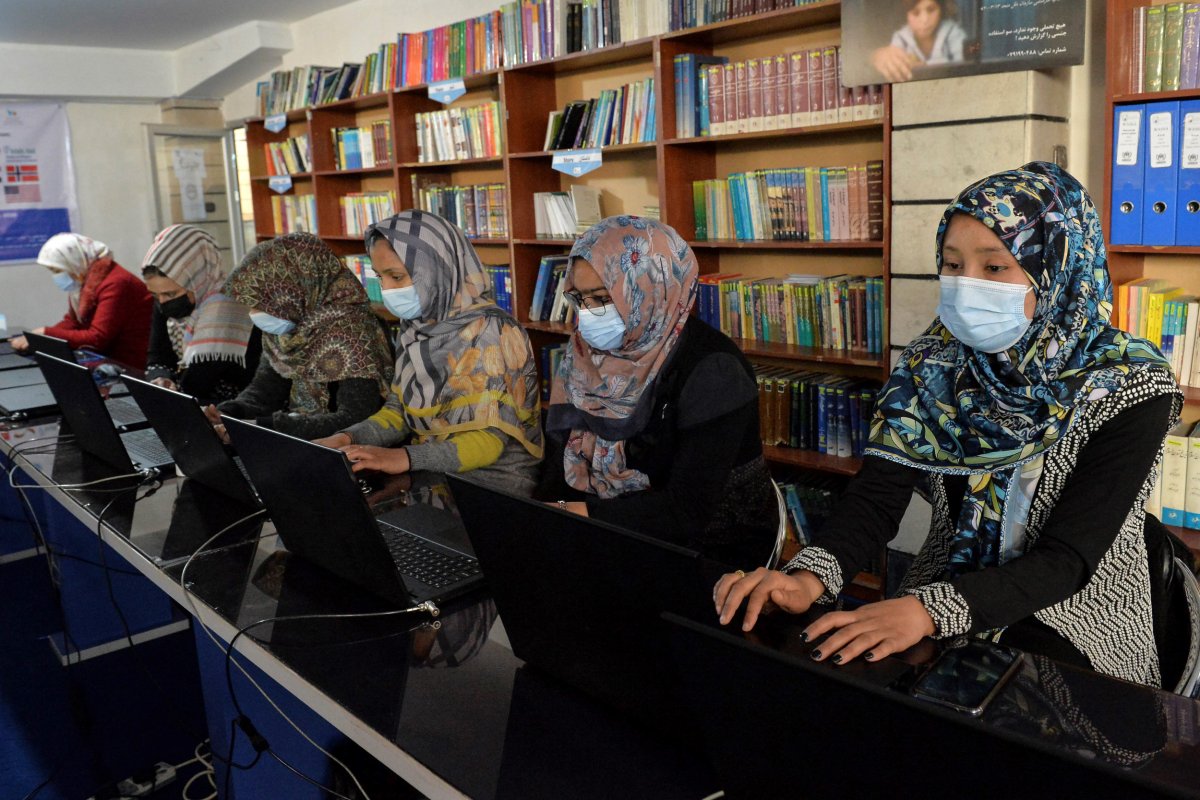The United States' decision to withdraw troops from Afghanistan without peace agreements in place between the Taliban and the Afghan government has left many fearful about what the future will hold for women in the region.
Roya Rahmani, the Afghan ambassador to the U.S., said she is worried that violence in the country will "continue or even possibly escalate," which she said is likely to have a direct impact on Afghan women.
"Women have frequently been made a victim of this conflict, both in ways we can see and in ways that are invisible," Rahmani told Newsweek. "To continue fighting would be to continue victimizing Afghan women who played no part in initiating or perpetuating the conflict, but who have suffered greatly nonetheless."
When the Taliban held control in Afghanistan during the 1990s, women were required to cover their skin while in public, and were not permitted to leave their homes without a male family member to accompany and supervise them. Women could not go to school, work or engage in politics—and women found to be in violation of the Taliban's rules faced harsh discipline.
"A woman could be flogged for showing an inch or two of skin under her full-body burqa, beaten for attempting to study, [or] stoned to death if she was found guilty of adultery," according to Amnesty International.

The violence and oppression Afghan women endured under the Taliban's rule abated after U.S. and allied troops established a presence in the country in the early 2000s.
But now that U.S. troops are leaving without a commitment from the Taliban on continued protections for women, many in the region who are able to leave are in the process of doing so—and the women who are left behind are feeling hopeless, according to Belquis Ahmadi, a senior program officer with the United States Institute of Peace (USIP), an agency of the federal government that "was established by Congress in 1984 as an independent institution devoted to the nonviolent prevention and mitigation of deadly conflict abroad," according to its website.
Ahmadi told Newsweek she has been in touch with women in Afghanistan's capital city and provinces who told her they are afraid for their families' safety and for their own rights to freedom and life. Ahmadi said news of the decision to withdraw troops wasn't surprising, but proceeding with that withdrawal without assurances from the Taliban is "shocking" and "a slap in the face."
Ahmadi said one woman recently told her she had given up and was "'just waiting for my day to come.'"
Ahmadi said the woman told her, "'I feel no one can help us.'"
The violence many expected has already begun. According to Reuters, Taliban fighters began attacking the Helmand Province on Monday, shortly after U.S. troops transferred control of a base in the area to Afghan troops. Violence was reported in other provinces as well, with Afghanistan's Ministry of Defense reporting at least 181 Taliban fighters had died in the conflict by Tuesday.
The sudden uptick in violence is believed to be in response to the U.S. missing a troop withdrawal deadline that the Taliban agreed to while former President Donald Trump was in office last February. Under that agreement, which did not involve Afghan government officials, all U.S. troops were to be out of Afghanistan by May 1.

President Joe Biden announced last month that troops would begin withdrawing from Afghanistan on May 1 but would do so slowly, with the withdrawal period expected to conclude before the 20th anniversary of the September 11 attacks this fall. Those attacks were what drew the U.S. into the region in the first place, launching a "forever war" that Biden said he was determined to end.
Speaking to the American people from the Treaty Room of the White House, in which former President George W. Bush initially announced military action in response to the September 11 attacks, Biden said he made his decision about when and how to withdraw U.S. troops following consultations with Afghanistan's president, the U.S. Congress, U.S. military leaders and others.
"It's time to end America's longest war," Biden said. "It's time for American troops to come home."
Rahmani told Newsweek the withdrawal of U.S. troops from Afghanistan was a "natural step" in the evolution of the two countries' partnership.
"Over the past 20 years, the U.S.-Afghan relationship has evolved from a military intervention to a true bilateral partnership centered on security, economic, cultural, and diplomatic cooperation," Rahmani said.
The ambassador added that the two governments are "working together closely as we transition into this next phase of our partnership in order to ensure that our shared goals and objectives are still met," even without U.S. troop presence in the region.
Mahbouba Seraj, the executive director of the nonprofit Afghan Women's Skill Development Center, also said the withdrawal of U.S. troops was expected.
"The time was coming that the Americans would go home," Seraj told the Associated Press.
Advocates for women's rights in Afghanistan are concerned that last year's agreement between the U.S. under Trump and the Taliban did not include specific qualifications for the Taliban to meet in order for the U.S. to proceed with its troop withdrawal.

While the Taliban said in a statement obtained by the AP that women would be allowed to continue working in "education, business, health and social fields" so long as they wear "correct" Islamic hijabs, the AP noted that the Taliban did not address women's rights in politics or their rights to move freely in society without male supervision.
Ahead of Trump's troop withdrawal agreement last February, the U.S. Congress ordered through the USIP the creation of a bipartisan commission, known as the Afghanistan Study Group, to assess the situation in Afghanistan.
The commission was tasked with providing perspectives on how the U.S. would be impacted if the Taliban and Afghan government reached an agreement on governing peacefully without a U.S. troop presence.
In February, the Afghanistan Study Group presented a report that noted the ongoing nature of the Taliban-Afghan government negotiations, and recommended a slow and "conditions-based" approach to the U.S. troop withdrawal.
"If we walk away, we'll leave behind chaos, if not civil war," said commission co-chair General Joseph Dunford, according to a USIP report analysis.
Seraj similarly wanted the U.S. to require more detailed commitments from the Taliban about rights for women before committing to withdrawing U.S. troops.
"We keep yelling and screaming and saying, for God's sake, at least do something with the Taliban, take some kind of assurance from them," Seraj told the AP.
In March, a Congressional Research Service report noted that the Taliban and Afghan government "appear far apart" on several important issues, including women's rights, amid their ongoing negotiations.

"Major differences remain in the two sides' respective visions for the future of Afghanistan, including the structure of the Afghan state and what rights the state recognizes for Afghan citizens, especially women," the report said.
It also warned of the Taliban's ability to regain control in the region through use of force.
"Some Afghan officials reportedly suspect the Taliban of remaining in negotiations long enough to secure a full U.S. withdrawal, after which the Taliban would capitalize on their advantage on the battlefield to seize control of the country by force," the report said.
Ahmadi told Newsweek many people in Afghanistan's middle class have either left the country already in anticipation of the Taliban's return or are in the process of making their escape. These departures could make it easier for the Taliban to regain power, she said.
"We will be dealing with a situation that the educated Afghans would leave the country, and that will be a perfect environment for the Taliban, for the terrorist groups from the region and globally, to build safe havens in Afghanistan," Ahmadi said.
But even as women in Afghanistan begin to lose hope, Ahmadi said the U.S. "still has leverage" it can use. She suggested placing sanctions on Pakistan, which Reuters reported last month provides intelligence support to the Taliban, though Pakistan has disputed those allegations. Ahmadi also suggested the U.S. could place sanctions on individual Taliban leaders who have assets in other countries.

For now, Ahmadi said she hopes the U.S. will continue to share intelligence with Afghanistan's security forces and provide other support in the aftermath of the U.S. troop withdrawal. She said it will also be important for the U.S. to be watchful of "the humanitarian crisis that will unfold" and help those who want to leave the country.
On a wider scale, Rahmani said the international community is paying close attention to see what the next era of the Taliban will look like. She noted that the Taliban in the past has blamed the presence of foreign troops for its violence—an excuse it will no longer have as U.S. and allied troops leave.
"Based on their justifications, there is no further reason to fight," Rahmani told Newsweek. "It is the time for them to lay down their weapons."
She said the Taliban will be under close scrutiny.
"The world is watching, and will soon see if they will demonstrate that they are actually committed to peace," Rahmani said.
Correction: The headline of this story has been revised to reflect the growing concern for Afghan women in the U.S. and by those who represent Afghanistan abroad.
Uncommon Knowledge
Newsweek is committed to challenging conventional wisdom and finding connections in the search for common ground.
Newsweek is committed to challenging conventional wisdom and finding connections in the search for common ground.
About the writer
Meghan Roos is a Newsweek reporter based in Southern California. Her focus is reporting on breaking news for Newsweek's Live ... Read more
To read how Newsweek uses AI as a newsroom tool, Click here.








